If you're building real-time communication into your app, you've likely come across MirrorFly. It's one of the few platforms offering both cloud and self-hosted SDKs for chat, voice and video, and activity feeds, making it a popular choice for teams with strict compliance, branding, or infrastructure requirements.
But finding the right communication provider isn't easy. From performance and pricing to moderation and extensibility, the details matter, especially as your app scales.
This guide compares MirrorFly to eight top alternatives offering bundled chat, voice, video, and activity feeds. You'll get an overview of each platform's strengths, limitations, use cases, and pricing to choose the best fit for your product roadmap.
Let's start with a closer look at MirrorFly's features and positioning.
MirrorFly Overview
MirrorFly is a real-time communication platform that offers chat, voice, and video APIs for mobile and web apps. Its key differentiator is flexibility; teams can choose between a cloud-hosted option or a fully self-hosted solution, making it a strong fit for apps with strict data residency, compliance, or branding requirements.
Let's explore its pros and cons, notable features, primary use cases, and pricing plans.
Advantages of MirrorFly
-
Flexible Deployment Models: MirrorFly is one of the few providers offering both cloud-hosted and on-premise SDKs. This gives teams full control over data storage, infrastructure, and compliance.
-
Voice, Video, and Chat in One Stack: MirrorFly supports real-time messaging, 1:1 and group voice calls, and video conferencing. These features are available across its SDKs, making it easier to manage all communication channels through a single integration.
-
White-Label Customization: For teams that need complete branding control, MirrorFly provides fully customizable UI components, along with options to manage user data, servers, and authentication workflows. This is particularly useful for enterprise apps or platforms requiring tailored user experiences.
-
Security and Compliance: MirrorFly supports key compliance standards like HIPAA and GDPR, along with features like end-to-end encryption, single sign-on (SSO), and audit logs. This makes it a nice option for apps in healthcare, fintech, or education.
-
Support for 150+ Languages: The platform includes real-time translation features covering more than 150 languages, helping apps scale across regions and user demographics with minimal overhead.
Drawbacks of MirrorFly
-
Limited Feed Customization and Discovery Tools: MirrorFly now offers activity feeds, but its capabilities are relatively basic compared to providers that specialize in feed-based engagement.
-
Lightweight UI Kits and No-Code Tools: While MirrorFly offers UI components, they're less robust than the cross-platform kits from providers like Stream. The platform also lacks no-code or visual builders, which could slow prototyping or MVP launches for lean teams.
-
Developer Experience and Documentation: The platform's developer documentation is functional but lacks the depth and polish of more mature providers. Teams building complex workflows or looking for community examples may find the learning curve steeper.
-
Moderation Is Basic: MirrorFly includes essential moderation tools like profanity filters, user blocking, and admin roles. However, it lacks built-in video and voice moderation or advanced tooling for managing large communities, making it less ideal for social or UGC-heavy apps out of the box.
Main Features
MirrorFly organizes its core functionality into chat, voice, video, feeds, and security. Here's a closer look at what's included in each category:
-
Messaging: 1:1 and group chat, message history, typing indicators, read receipts, delivery status, offline messaging, message translation, and push notifications. Messages are end-to-end encrypted and can include media attachments such as images, files, and voice notes.
-
Voice & Video: Supports 1:1 voice and video calls, group conferencing, call recording, SIP trunking, and interactive live broadcasting. The platform also includes basic call moderation and participant management features.
-
Activity Feeds: Create user timelines, post reactions, comments, shares, and notifications. Feeds can be personalized or grouped by topic or user activity. Basic content management tools are included for feed posts.
-
Moderation & Admin Tools: Includes profanity filtering, user muting, blocking, and banning. Admin roles can manage conversations, calls, and feed content. However, advanced moderation (like AI-powered video and audio scanning) is not offered.
-
Platform & Integration Support: SDKs available for iOS, Android, React Native, Flutter, and web. MirrorFly also supports WebRTC for video and integrates with backend tools via REST APIs and webhooks.
-
Security & Compliance: MirrorFly supports HIPAA and GDPR compliance, end-to-end encryption, role-based access control, and audit logs. On-premise deployment offers additional flexibility for apps with strict compliance needs.
Use Cases
MirrorFly supports a range of use cases where secure communication is important for user engagement, including:
-
Telehealth Communication: Offer secure, HIPAA-compliant chat and video calls between patients and providers, with support for file sharing and appointment follow-ups.
-
Online Marketplaces: Enable real-time messaging and optional calling between buyers and sellers to improve trust and reduce cart abandonment.
-
Edtech Platforms: Support student-teacher collaboration with group chat, video calls, and moderation features across devices.
-
Financial Services & Fintech: Add secure, compliant messaging and calling to banking or investment apps with encryption and audit logging.
-
Social Communities & Live Events: Power live interaction with in-app chat, video, and activity feeds to drive engagement and user participation.
MirrorFly Pricing
MirrorFly offers pricing plans based on monthly active users (MAU), with separate tiers for chat-only and full communication features. For apps with up to 5,000 MAU, the following cloud plans are available:
Essentials Plan — $399/month
-
Unlimited messaging and storage
-
Includes private and group chat
-
Voice and video calling not included
Premium Plan — $999/month
-
Everything in Essentials plus 7,500 minutes of 1:1 and group voice/video calling
-
Higher concurrency limits (50% or more of MAU)
MirrorFly also offers a self-hosted option with full source code access and on-premise deployment. However, pricing for this model is not published on their website and must be obtained through their sales team.
Additionally, MirrorFly does not offer a free trial, which can make it harder to evaluate features and performance before committing.
What to Consider: MirrorFly Versus a Competitor
When comparing MirrorFly to other providers, it's important to go evaluate the full communication stack. This is especially true if your app needs to scale, comply with regulations, or support multiple real-time experiences.
Consider:
-
Cloud vs. Self-Hosted Flexibility: MirrorFly is one of the few providers offering both options. If your team needs to control infrastructure for compliance or branding reasons, that's a major advantage. But some competitors may offer faster setup or deeper analytics on fully managed plans.
-
Activity Feeds and Engagement Tools: MirrorFly offers a broad set of feed features, but for apps that rely on feeds as a core engagement driver, it's worth considering a provider with a longer track record and deeper infrastructure purpose-built for personalized timelines at scale.
-
UI Kits and Developer Velocity: MirrorFly includes SDKs and components, but other platforms may offer richer, cross-platform UI kits and no-code tools to help teams ship faster and reduce frontend lift.
-
Pricing Transparency and Predictability: While MirrorFly now lists starting prices, competitors may provide more detailed tiering, usage calculators, or pay-as-you-go options to help you plan costs at scale.
-
Moderation and Safety Features: MirrorFly includes built-in AI moderation, profanity filters, and hate speech detection, along with compliance features like HIPAA and OWASP alignment. However, some competitors still offer more advanced tools like video moderation, moderation dashboards, or automated escalation workflows.
-
Support and Documentation: Some providers offer 24/7 support, public performance benchmarks, and large developer communities. If your team needs fast onboarding or enterprise-grade SLAs, that's worth factoring into your decision.
MirrorFly Versus Top 8 Alternatives
MirrorFly vs. Stream
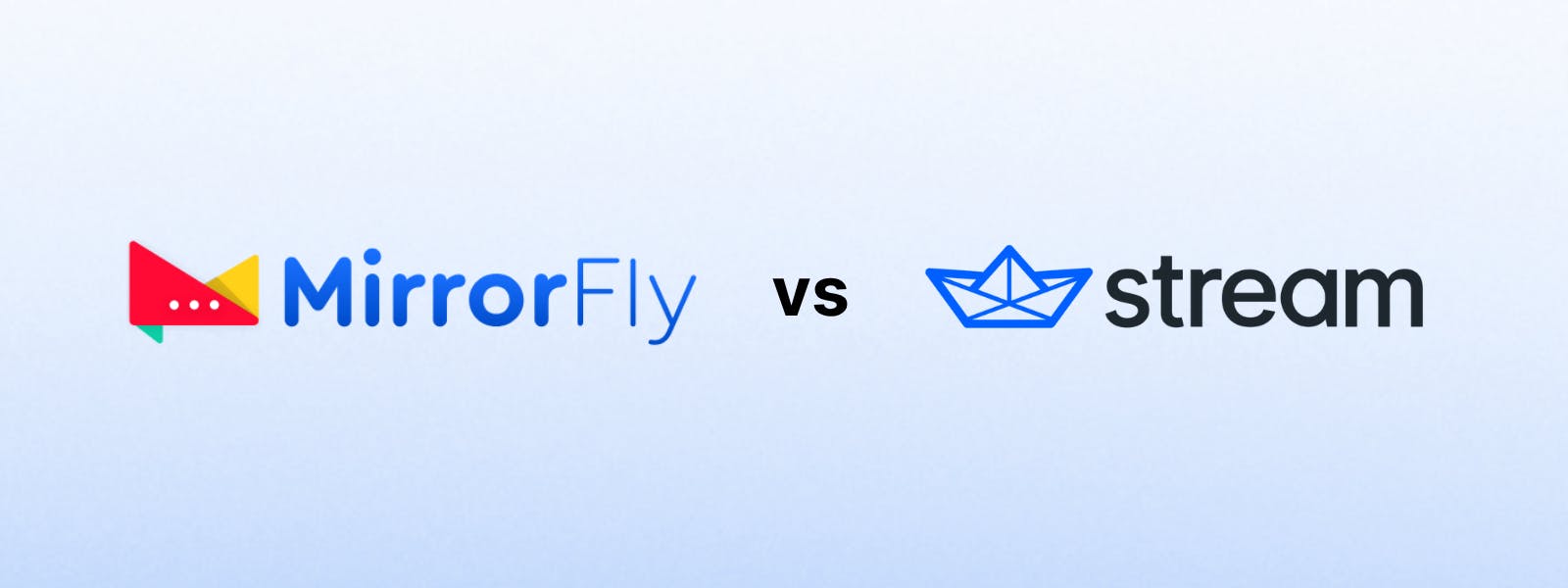
Both MirrorFly and Stream offer in-app messaging, voice, video, activity feeds, and moderation features backed by developer-friendly SDKs, but they differ in architecture, extensibility, and go-to-market focus.
MirrorFly supports both cloud and self-hosted deployments, making it ideal for teams that need full control over data and infrastructure. It offers chat, calling, and activity feeds under a single license, with options for full source code access and on-premise hosting. This flexibility appeals to apps in highly regulated industries like healthcare and finance.
Stream, on the other hand, is a cloud-native platform designed for scale, performance, and developer speed. It offers deeply customizable APIs for chat, voice, video, and feeds—plus out-of-the-box UI kits, moderation tools, and real-time analytics.
Stream's backend is optimized using Go, RocksDB, and Raft, and its global edge network ensures low latency and high reliability across regions.
The biggest differences come down to scalability, feed capabilities, and moderation. MirrorFly offers the basics, while Stream supports advanced features like algorithmic feed ranking, robust AI moderation, and slash commands—plus unlimited group chat participants and SFU cascading for video performance.
Stream Main Use Cases
-
Social & Team: Create vibrant communities and collaboration tools with integrated chat, voice, and video to support real-time messaging, reactions, and user presence.
-
Virtual Events: Power audience engagement with live chat and video features for Q&As, backstage communication, and social interaction during webinars and virtual conferences.
-
Edtech: Support interactive learning with chat and video for classrooms, study groups, and lectures, complete with moderation features to keep discussions on track.
-
Marketplace: Facilitate buyer-seller communication through secure chat and optional voice/video calls, while maintaining trust with moderation and message history.
-
Telehealth: Deliver HIPAA-compliant messaging and calling between patients and providers, with real-time media sharing and secure communication workflows.
-
Gaming: Enable in-game coordination and community chat with low-latency audio and messaging—ideal for multiplayer games, livestreams, and esports interaction.
-
Sports: Engage fans before, during, and after games using real-time chat, audio rooms, and reaction-driven highlights to boost community participation.
-
Dating: Support safe and meaningful interactions through private chat and optional video or voice calling, backed by moderation and chat history.
-
Fintech: Equip financial apps with secure real-time messaging and voice/video tools to streamline onboarding, customer support, and client advising.
Stream Versus MirrorFly
-
Video Moderation: MirrorFly offers chat moderation, while Stream provides integrated moderation for text, images, and video using built-in AI.
-
Chat Features: Stream includes advanced capabilities like slash commands, message states, and offline queuing, which are not available out of the box with MirrorFly.
-
Activity Feeds: MirrorFly supports basic activity feeds, whereas Stream offers fully ranked, personalized feeds designed to boost engagement.
-
Scalability and Reliability: Stream is optimized for global performance with SFU cascading, edge routing, and low-latency audio features like OPUS-Red and OPUS-DTX.
-
Deployment Flexibility: MirrorFly supports cloud and self-hosted deployments with source code access, while Stream offers a secure, cloud-native stack.
-
UI Kits and Developer Tools: Stream provides full-featured UI kits and dev tools across platforms; MirrorFly's component library is more limited in scope.
-
Cost Effectiveness: Stream offers more features for less, supporting 10,000 MAU for $399/month with advanced chat and no channel limits, while MirrorFly charges the same for just 5,000 MAU. While MirrorFly includes moderation in its base plans, Stream uses a modular model—letting you scale into advanced tools like moderation and feeds only when you need them.
Stream Pricing
Stream's Chat, Video & Audio, and Moderation are divided into unique plans based on monthly active users, with advanced features unlocked at higher levels.
-
Start: Starts at $399/month for up to 10,000 MAU
-
Elevate: Starts at $599/month for up to 10,000 MAU
-
Enterprise: Talk to Sales
-
Pay-As-You-Go: Starts at $0.30/month for 1,000 participant minutes
-
Enterprise: Talk to Sales
-
Starter: Starts at $5,000/ year for three moderators
-
Standard: Starts at $20,000/ year for five moderators
-
Enterprise: Talk to Sales
MirrorFly vs. Twilio
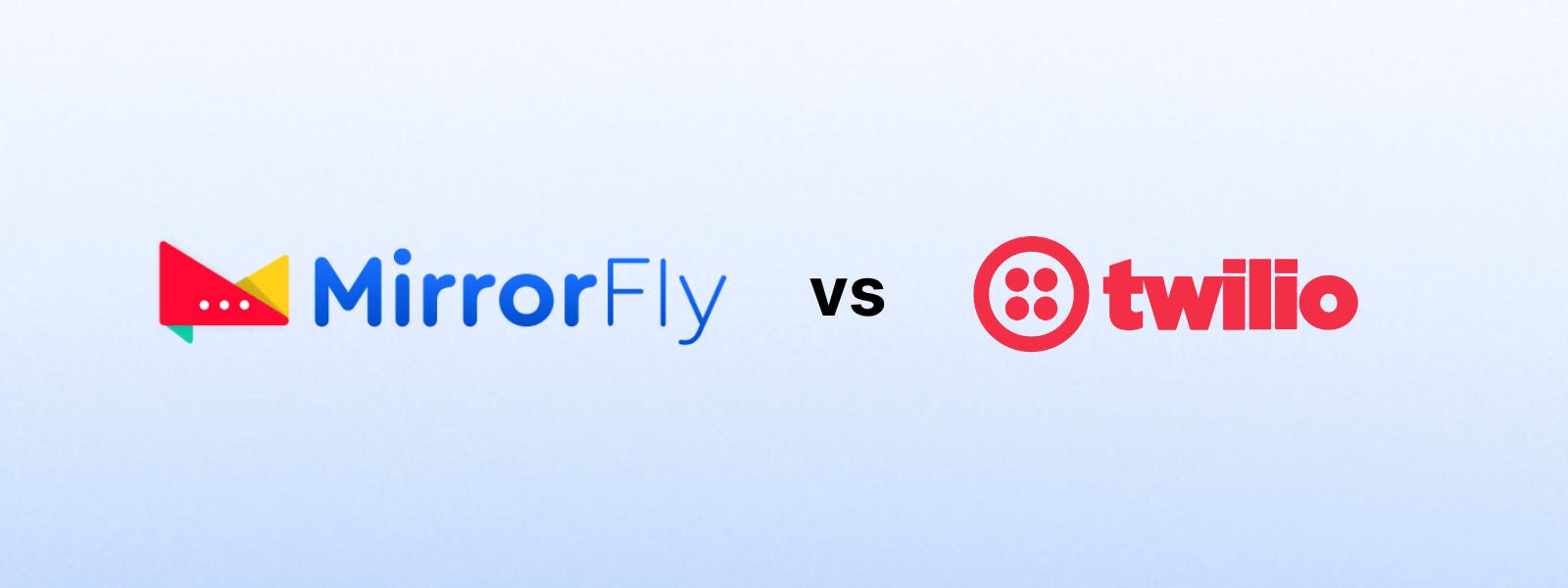
Twilio is a cloud communications platform known for its extensive suite of APIs spanning SMS, voice, video, email, and in-app chat. Its Conversations API supports omnichannel messaging across chat, SMS, and WhatsApp, making it a popular choice for customer support and transactional communication across industries like healthcare, logistics, and retail.
MirrorFly Versus Twilio
Twilio's Conversations API is designed for multichannel engagement, allowing developers to manage 1:1 and group messaging across platforms like SMS, WhatsApp, and in-app chat. MirrorFly, by contrast, focuses specifically on in-app communication, offering a bundled SDK with chat, voice, video, and activity feeds under a single integration.
Both platforms support core messaging features such as message history, media attachments, read receipts, push notifications, and moderation. Both also meet key compliance standards like HIPAA and GDPR, making them suitable for enterprise or regulated environments.
However, Twilio offers fewer SDKs and does not provide out-of-the-box UI kits for rapid frontend development. MirrorFly, while not as modular, delivers a white-label experience with customizable UI components and full deployment flexibility, including self-hosting and source code access.
Where Twilio shines is infrastructure reliability. It boasts a 99.95% uptime SLA, a transparent usage-based pricing model, and deep integration across communication channels. MirrorFly, on the other hand, is better suited for teams building user-to-user engagement inside their app, where real-time chat, calling, and feeds are central to the experience.
Twilio Pricing
Twilio's pricing for chat and video is usage-based and varies by product.
Chat Pricing (Conversations API):
-
Usage: $0.05/ active user per month
-
Media Storage: $0.25/ GB per month
Video Pricing:
-
Video Calling: $0.004/ participant per minute
-
Participant Recordings: $0.004/ participant per minute
-
Recording: $0.004/ per recorded minute
MirrorFly vs. CometChat

CometChat is a real-time communication platform offering in-app chat, voice, and video APIs, along with built-in moderation and engagement tools. It's commonly used in industries like education, dating, and telehealth, where fast time-to-market and prebuilt UI kits help teams ship quickly.
MirrorFly Versus CometChat
MirrorFly and CometChat both support messaging, voice, and video features, but differ significantly in how those features are delivered and deployed. MirrorFly offers both cloud and on-premise hosting, giving teams full control over data, infrastructure, and compliance. CometChat, by contrast, is a cloud-native platform with prebuilt UI kits and no-code tools designed for speed and accessibility.
Both platforms include standard chat capabilities like group messaging, file sharing, push notifications, and presence indicators. Each also supports HIPAA/GDPR compliance, making them suitable for healthcare and enterprise-grade use cases.
However, CometChat lacks native support for activity feeds, whereas MirrorFly includes feeds as part of its bundled offering. MirrorFly also enables full source code access and self-hosting—ideal for highly regulated industries—while CometChat focuses on vertical-specific extensions and plug-and-play development workflows.
Where CometChat stands out is frontend tooling. It provides 12 SDKs and polished UI kits for platforms like React, Flutter, and Unity, as well as no-code widgets to help teams go live faster. MirrorFly, while customizable, may require more lift to build polished frontend experiences from scratch.
CometChat Pricing
Chat & Messaging:
-
Basic: Starts at $239/month for up to 1,000 MAU
-
Advanced: Starts at $339/month for up to 1,000 MAU
-
Enterprise: Custom pricing
Voice & Video Calling:
-
Pay-as-you-go:
-
Voice calling: $0.001/ user minute
-
Video calling: $0.003/ user minute
-
Voice & video call recording: $0.006/ minute
-
Chat pricing estimates for up to 50,000 MAU are available directly on Comet's website using their cost calculator. Custom pricing for Chat, Voice, and Video Calling requires contacting sales.
MirrorFly vs. Sendbird
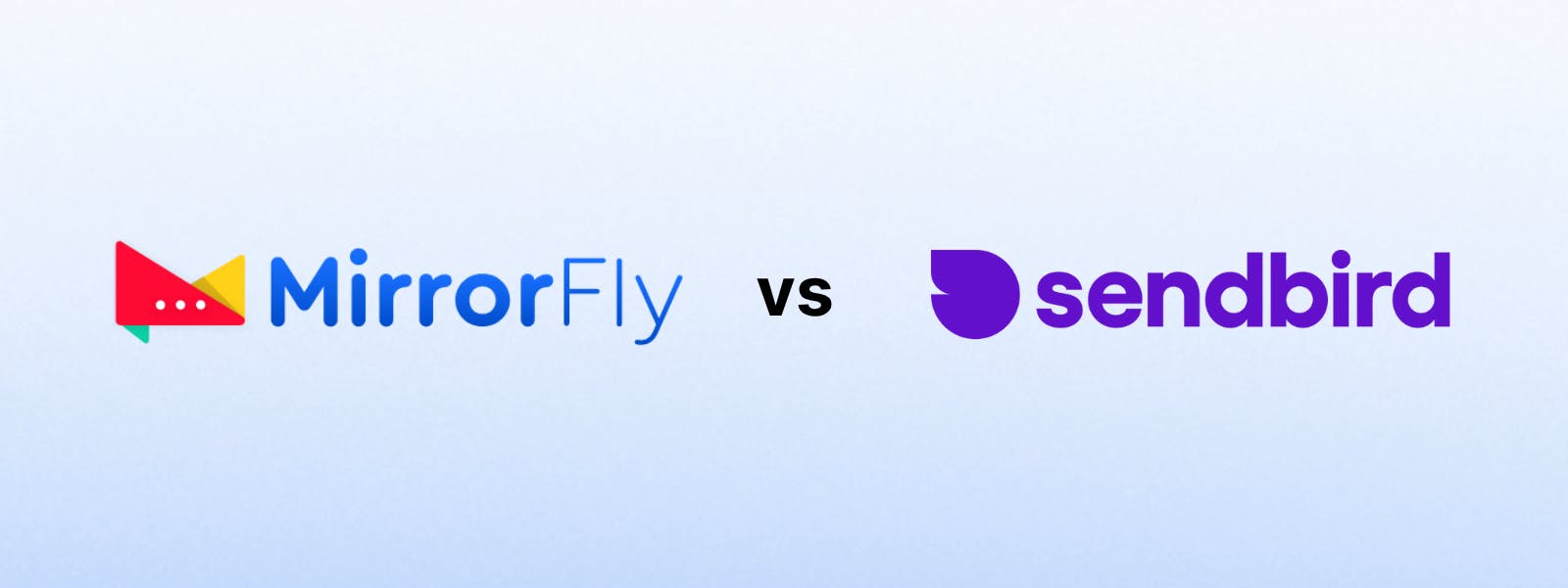
Sendbird is a widely adopted communications platform that offers APIs for in-app chat, voice, and video, along with UI kits and moderation tools. It's used by enterprise apps across industries like social networking, digital health, and marketplaces where secure, scalable messaging is critical.
MirrorFly Versus Sendbird
MirrorFly and Sendbird both offer chat, voice, and video capabilities, but they differ in architecture, extensibility, and go-to-market approach. MirrorFly provides the flexibility of self-hosted or cloud deployments, plus full source code access, making it ideal for apps with strict compliance or infrastructure requirements. Sendbird, in contrast, is a fully managed cloud solution focused on developer experience, with robust documentation and battle-tested APIs.
Both platforms cover essential messaging features like typing indicators, push notifications, read receipts, file uploads, and group chat. Each also offers UI kits, supports HIPAA and GDPR compliance, and includes moderation tools for managing user behavior.
Where Sendbird stands out is in frontend polish and documentation quality. It delivers refined UI kits, a powerful dashboard, and mature third-party integrations that speed up implementation. MirrorFly offers greater control and flexibility but may require more engineering effort to fully customize and deploy.
MirrorFly also includes activity feeds and self-hosting options, two areas where Sendbird has limited or no support. If your app demands full control over infrastructure or needs bundled feeds alongside messaging, MirrorFly may be the better fit.
Sendbird Pricing
Sendbird Chat and Video are priced based on monthly active users. Plans include:
Chat Pricing:
-
Starter: Starting at $349/month for 5,000 MAUs
-
Pro: Starting at $499/month for 5,000 MAUs
-
Enterprise: Contact Sales
Video Pricing:
-
Peer-to-peer: $0.0014/ per minute
-
Server-relayed: $0.0035/ per minute
-
Cloud recording: $0.0059/ per minute
MirrorFly vs. Agora
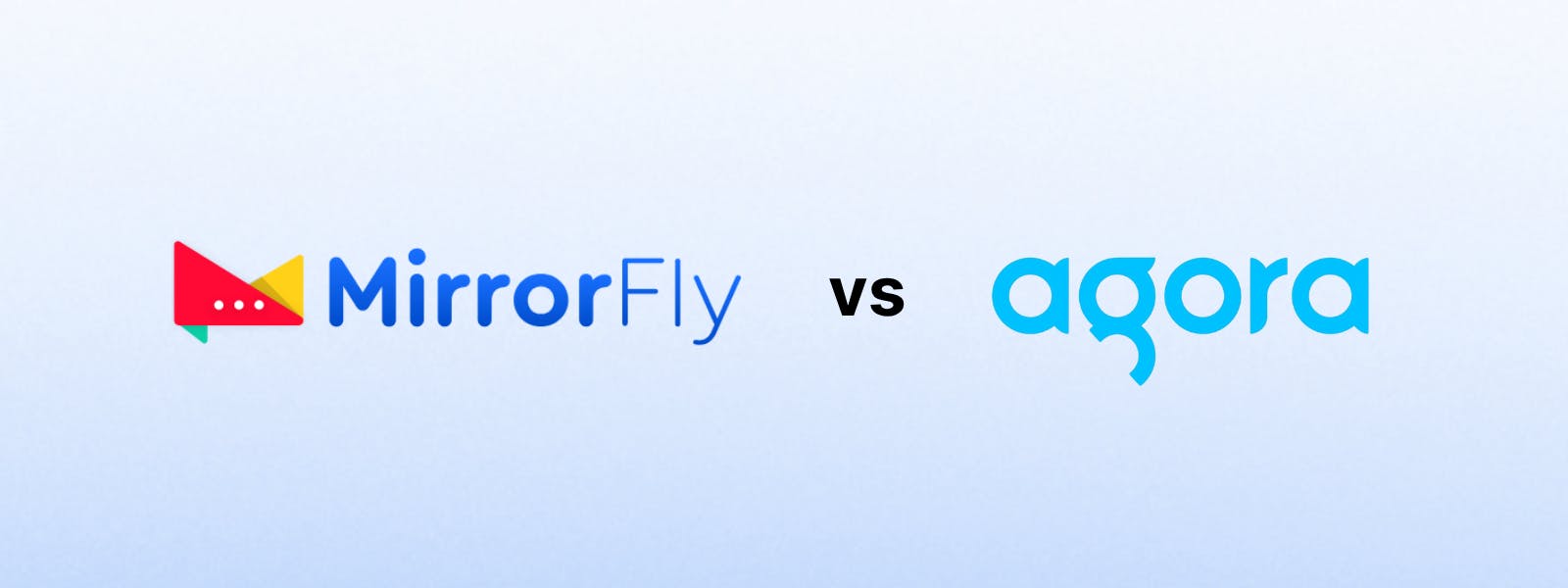
Agora is a real-time engagement platform best known for its global infrastructure and high-performance voice and video APIs. While it originally focused on audio/video, it now also offers a chat SDK, making it a more complete communications solution for apps in industries like gaming, education, and social livestreaming.
MirrorFly Versus Agora
Both MirrorFly and Agora offer in-app messaging, voice, and video, but their strengths lie in different areas. Agora's edge lies in ultra-low latency, real-time audio and video powered by its proprietary SD-RTN™ network—ideal for livestreaming, virtual classrooms, and interactive events. MirrorFly provides more deployment flexibility, with options for self-hosted or cloud delivery and full access to source code.
Agora's messaging SDK supports essential chat features, including user presence, push notifications, and media sharing. MirrorFly includes those as well—but goes further with bundled activity feeds and support for on-premise environments. If your app needs feed-driven engagement alongside real-time communication, MirrorFly may offer a more unified solution.
Moderation is another key differentiator. MirrorFly includes basic moderation tools out of the box, while Agora relies on third-party integrations (e.g., Microsoft Azure Content Moderator) for content filtering and abuse detection. This could require additional engineering work and cost.
Agora Pricing
Agora offers free usage up to a threshold and scales pricing based on MAU.
Chat Pricing:
-
Starter: Starts at $349/month for up to 5,000 MAU
-
Pro: Starts at $699/month for up to 10,000 MAU
-
Enterprise: Talk to Sales
Video Pricing:
-
Video HD: $3.99/ 1,000 minutes
-
Video Full HD: $8.99/ 1,000 minutes
MirrorFly vs. PubNub
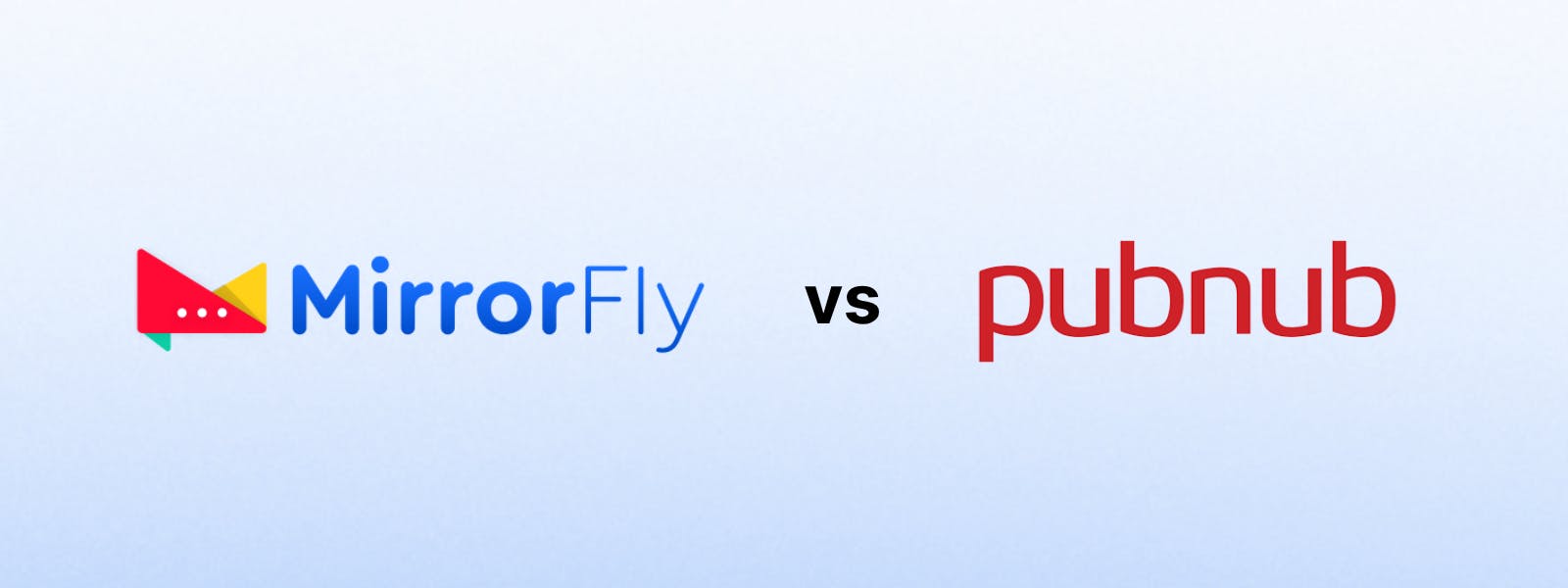
PubNub is a real-time communication platform built on a publish-subscribe architecture that powers custom chat, presence, and data sync across apps. It's widely used for IoT dashboards, multiplayer gaming, and applications requiring fine-grained control over real-time messaging infrastructure.
MirrorFly Versus PubNub
Both MirrorFly and PubNub provide real-time messaging capabilities, but they target different development needs. MirrorFly offers a bundled solution for in-app chat, voice, video, and activity feeds, complete with cloud or on-premise deployment options. PubNub, in contrast, is an infrastructure-first platform that excels at real-time data delivery but requires more engineering to build full-featured chat or video experiences.
PubNub supports mobile and web SDKs with features like message history, presence, and access control, but lacks polished UI kits and built-in video functionality. MirrorFly, on the other hand, includes SDKs, UI components, and bundled voice/video APIs, allowing teams to move faster without piecing together multiple services.
Moderation is another dividing line. MirrorFly includes built-in tools like profanity filters and user blocking, while PubNub requires third-party integrations or custom code to achieve comparable content control. For teams focused on messaging as the core product experience, MirrorFly delivers more out of the box.
PubNub Pricing
PubNub offers tiered pricing plans based on monthly active users and feature access.
-
Starter: From $98/month
-
Pro: Contact Sales
MirrorFly vs. TalkJS
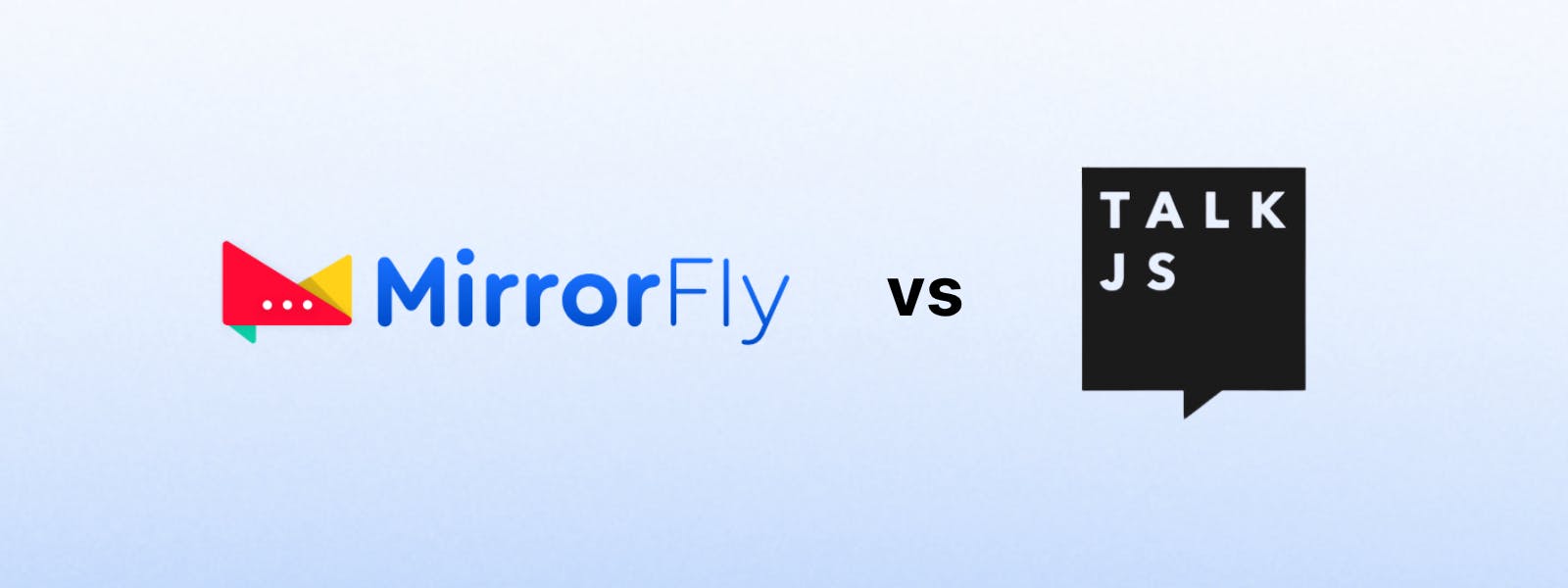
TalkJS is a lightweight chat API designed to help developers add messaging to web and mobile apps quickly using prebuilt UIs. It's ideal for marketplaces, education platforms, and virtual events, where chat is important, but not the core product.
MirrorFly Versus TalkJS
MirrorFly and TalkJS both support in-app messaging, but they differ significantly in depth and flexibility. MirrorFly provides a full communications suite, including chat, voice, video, and activity feeds, with options for cloud or self-hosted deployment. TalkJS, by contrast, focuses solely on messaging and simplifies setup with a drop-in UI and minimal configuration.
TalkJS supports key messaging features like file sharing, message history, read receipts, and basic moderation. MirrorFly offers those same features plus native support for voice/video calls, presence, and more advanced customization.
Where TalkJS excels is speed to market. Its prebuilt chat UIs allow teams to launch quickly with limited engineering effort. MirrorFly offers more control and extensibility, but may require a longer implementation cycle if you're aiming for a fully customized user experience.
MirrorFly is a stronger fit for apps where communication is a core part of the product, while TalkJS suits platforms where messaging is a supporting feature.
TalkJS Pricing
TalkJS offers three pricing plans based on MAU and feature access:
-
Basic: $279/month for 10,000 MAU
-
Growth: $569/month for 25,000 MAU
-
Enterprise: Custom pricing
MirrorFly vs. Ably
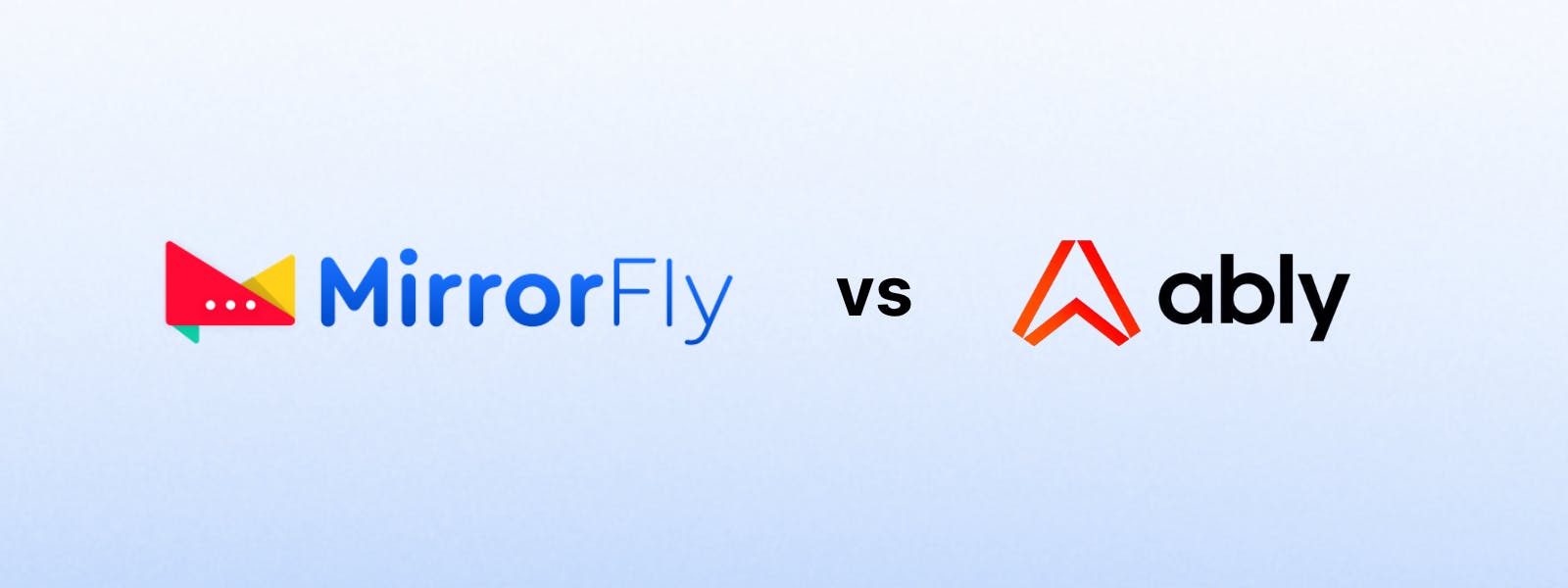
Ably is a real-time infrastructure platform built to deliver low-latency messaging, data sync, and pub/sub communication across distributed systems. It's commonly used in event-driven apps such as GPS tracking, collaborative tools, and live dashboards, but can also be extended to support chat functionality with custom development.
MirrorFly Versus Ably
MirrorFly and Ably both enable real-time communication, but they serve very different developer needs. MirrorFly provides a purpose-built SDK for in-app chat, voice, video, and activity feeds, packaged as a turnkey solution. Ably offers a flexible, high-performance infrastructure layer designed for engineers who want to build real-time features from the ground up.
Ably supports core messaging functions like pub/sub delivery, message history, presence, and data synchronization, but it lacks bundled UI components, native moderation, or support for audio/video. MirrorFly includes these features out of the box, helping product teams launch faster with fewer third-party dependencies.
In terms of architecture, Ably excels at delivering global low-latency performance and offers powerful guarantees around reliability and message ordering. MirrorFly, while also scalable, prioritizes frontend experience and engagement use cases over deeply customized infrastructure.
If you're building a fully custom chat experience on top of a real-time data layer, Ably is a strong backend foundation. If you need a complete, production-ready communication suite, MirrorFly is the more direct path.
Ably Pricing
Ably uses a usage-based pricing model:
-
Standard: $29/month + consumption
-
Pro: $399/month + consumptions
-
Enterprise: Contact Sales
Alternatives Comparison Chart
| Provider | Chat SDKs | Voice & Video | Activity Feeds | Built-in Moderation | UI Kits | Deployment Options | HIPAA Compliance |
|---|---|---|---|---|---|---|---|
| MirrorFly | ✅ | ✅ | ✅ | 🟡 (Limited to Chat) | ✅ (Basic Components) | Cloud & Self-Hosted | ✅ |
| Stream | ✅ | ✅ | ✅ (Advanced) | ✅ (AI + Video/Image) | ✅ (Cross-Platform) | Cloud | ✅ |
| Twilio | ✅ | ✅ | ❌ | ✅ (Admin + Partner AI) | 🟡 (Starter Kits) | Cloud | ✅ |
| CometChat | ✅ | ✅ | ❌ | ✅ (AI + Manual) | ✅ (12 SDKs) | Cloud | ✅ |
| Sendbird | ✅ | ✅ | ❌ | ✅ (Native + Partner AI) | ✅ (Robust Kits) | Cloud | ✅ |
| Agora | ✅ | ✅ (Core Strength) | ❌ | ❌ (Via Integration) | ✅ (UIKit + Builder) | Cloud | ✅ |
| PubNub | ✅ | ❌ (Requires Integration) | ❌ | ❌ (Requires Setup) | ❌ | Cloud | ✅ |
| TalkJS | ✅ | 🟡 (Voice Msg Only) | ❌ | ✅ (Basic Native) | ✅ (Prebuilt UI) | Cloud | ❌ |
| Ably | ✅ (Infra SDKs) | ❌ | ❌ | ❌ (Partner or Custom) | ❌ | Cloud | ✅ |
Is MirrorFly Right For You, Or Did You Find An Alternative?
The eight MirrorFly alternatives covered above offer strong options for teams building in-app messaging, voice, video, or feed-driven engagement.
Some platforms (like TalkJS or PubNub) are better suited for lightweight chat or highly custom infrastructure. Others (like Stream, Sendbird, or Agora) offer full-featured SDKs and global performance for scaling apps with complex real-time needs.
MirrorFly stands out for its deployment flexibility, bundled feature set, and self-hosted option with source code access. But if you need faster time to market, advanced moderation, or deeper feed functionality, one of the alternatives may be a better fit.
The best way to decide is to test. Many providers, including Stream, offer free trials or developer tiers, so you can validate features, performance, and integration effort before committing long term.

